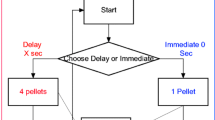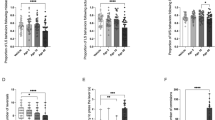Abstract
A laboratory decision-making paradigm was developed in which changes in behavioural planning in response to delays in reward delivery could be studied in the rat. The problem given was to choose between three behavioural options, lever-pressing or running into one of two arms fitted to the experimental chamber, in order to obtain rewards (water). Basically, the animal received rewards with a certain probability when pressing the lever. At certain random intervals, reward delivery by lever-presses was stopped. To restart the system, the animal had to abandon lever-pressing and run out into one of the arms. The arm lengths could be varied, and a time-delay for restarting the system could be introduced into one of the arms. These manipulations changed the arm preference so that a long arm, or an arm with a time delay, was avoided. It was specifically investigated whether the benzodiazepine diazepam selectively lowered the tolerance to accept reward delay. Such an effect of benzodiazepines has previously been proposed. After diazepam 1 mg/kg, the number of lever-presses before running into an arm and number of behavioural interruptions were increased, and interpreted to show a deficit in information processing and/or decision making. No evidence for a selective effect of diazepam to reduce tolerance to reward delays could be detected.
Similar content being viewed by others
References
Cooper SJ (1982) Benzodiazepine mechanisms and drinking in the water-deprived rat. Neuropharmacology 21:775–780
Dantzer R (1977) Behavioural effects of benzodiazepines: a review. Biobehav Rev 1:71–86
Gray JA (1978) The neuropsychology of anxiety: a synopsis of the 1977 Myers lecture. Br Psychol Soc 31:33–35
Gray JA (1981) Anxiety as a paradigm case of emotion. Br Med Bull 37:193–197
Gray JA (1982) Precis of the neuropsychology of anxiety: an enquiry into the functions of the septo-hippocampal system. Behav Brain Sci 5:469–534
Haefely WE (1978) Behavioural and neuropharmacological aspects of drugs used in anxiety and related states. In: Lipton MA, DiMascio A, Killam KF (eds) Psychopharmacology: a generation of progress. Raven Press, New York, pp 1359–1374
Houston A, Kacelnik IA, McNamara I (1982) Some learning rules for acquiring information. In: McFarland DS (ed) Functional ontogeny. Pitman, London, pp 141–191
Ljungberg T, Enquist M (1986) Decision making by rats in an unpredictable laboratory environment — final decision rules. Anim Behav 34:1120–1128
Ljungberg T, Lidfors L, Enquist M, Ungersted U (1987) Impairment of decision making in rats by diazepam: implications for the “anticonflict” effects of benzodiazepines. Psychopharmacology 92:416–423
Sepinwall J, Cook L (1978) Behavioural pharmacology of antianxiety drugs. In: Iversen LL, Iversen SD, Snyder SD (eds) Handbook of psychopharmacology, vol 13. Plenum Press, New York, pp 345–393
Shettleworth SJ (1984) Learning and behavioural ecology. In: Behavioural ecology — an evolutionary approach. Blackwell, Oxford, pp 170–194
Staddon JER (1983) Adaptive behavior and learning. Cambridge University Press, Cambridge
Thiebot M-H, Soubrie P (1983) Behavioural pharmacology of the benzodiazepines. In: Costa EMD (ed) The benzodiazepines; from molecular biology to clinical practice. Raven Press, New York, pp 67–92
Thiebot M-H, LeBihan C, Soubrie P, Simon P (1985a) Benzodiazepines reduce the tolerance to reward delay in rats. Psychopharmacology 86:147–152
Thiebot M-H, Soubrie P, Simon P (1985b) Is delay of reward mediated by shock-avoidance behavior a critical target for anti-punishment effects of diazepam in rats? Psychopharmacology 87:473–479
Treit D (1985) Animal models for the study of anti-anxiety agents: a review. Neurosci Biobehav Rev 9:203–222
Author information
Authors and Affiliations
Rights and permissions
About this article
Cite this article
Ljungberg, T. Diazepam and decision making in the rat: negative evidence for reduced tolerance to reward delay. Psychopharmacology 102, 117–121 (1990). https://doi.org/10.1007/BF02245755
Received:
Revised:
Issue Date:
DOI: https://doi.org/10.1007/BF02245755




